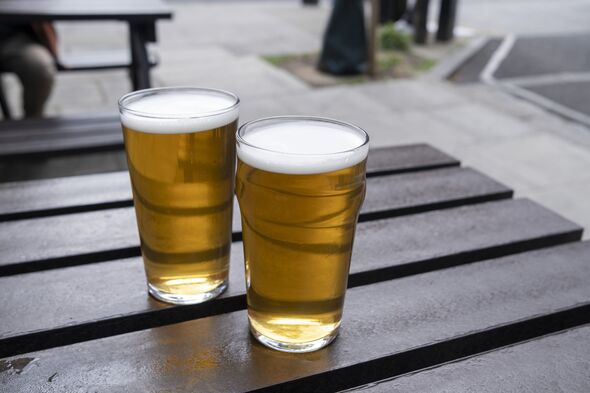Science
Experts Reveal Top 5 Pre-Drinking Snacks to Combat Hangovers

Hangovers have long been a common challenge for those who enjoy alcoholic beverages. Recent insights from experts at the mobile cocktail team, Spin and Shake, suggest that certain snacks consumed before drinking could significantly mitigate the unpleasant aftereffects of alcohol consumption.
According to representatives from Spin and Shake, the timing and choice of snacks are crucial. They emphasize that eating before the first drink, rather than after a night out, can help individuals feel better the next day. A spokesperson noted, “We’ve worked thousands of events, and one pattern always stands out. The guests who eat early, and eat smart, feel far better the next day than those who don’t.”
Understanding hangovers
A hangover typically presents a range of physical and mental symptoms following excessive alcohol intake. Common complaints include headaches, nausea, fatigue, and heightened sensitivity to light and sound. The team at Spin and Shake has compiled a list of five snacks that they believe can help reduce the impact of hangovers.
The Recommended Snacks
Salted peanuts top the list. Nutritionist Dr. Patel explains that these snacks contain fats and protein, which can slow the absorption of alcohol into the bloodstream. The salt in peanuts helps maintain fluid balance, thus reducing dehydration – a key factor in hangover symptoms. Dr. Patel adds, “It’s not a magic fix, but as a preventative step, it’s genuinely effective.”
Next on the list are cheese and crackers. The combination of fat from cheese and carbohydrates from crackers provides an optimal mix for slowing alcohol absorption. Spin and Shake experts describe this snack as filling yet light enough not to weigh you down.
Olives are highlighted as another beneficial option. Often overlooked, they are high in fat and can aid in hydration. The team frequently serves olives at private functions, noting their positive effects on guests.
Another recommended snack is avocado on toast. Dr. Patel points out that avocados are rich in potassium and healthy fats, supporting hydration and gut function. When paired with toast, they create a balanced base for alcohol consumption.
Lastly, hummus and pitta are suggested for their lightness and nutritional balance. A Spin and Shake spokesperson remarked, “It’s light, salty, and has protein and carbs. It works – and it’s always a crowd favourite.”
The Importance of Timing
Both Dr. Patel and Spin and Shake agree that the timing of these snacks plays a critical role. Consuming them before drinking allows the body to buffer the effects of alcohol, rather than trying to mitigate damage after it has occurred.
Dr. Patel states, “Once alcohol is in your system, your body is already under pressure. If you eat beforehand, you give your body more of a buffer to handle the alcohol gradually.”
Despite the common tendency to indulge in greasy food after a night out, this approach may not effectively reduce hangover symptoms. The Spin and Shake spokesperson highlights, “We see people pile into fast food after drinking, but by that point, it’s too late to undo the damage.”
In conclusion, the consensus is clear: what you eat before drinking can significantly influence your well-being the next day. While no snack can completely prevent a hangover, incorporating these suggestions could provide a valuable strategy for those looking to minimize the negative effects of alcohol consumption.
-

 Entertainment2 weeks ago
Entertainment2 weeks agoLove Island Star Toni Laite’s Mother Expresses Disappointment Over Coupling Decision
-

 Entertainment2 weeks ago
Entertainment2 weeks agoWoman Transforms Life with Boot Camp, Losing Nearly 9 Pounds in a Week
-

 Lifestyle3 weeks ago
Lifestyle3 weeks agoBring Birds to Events and Dine with Style: Trends This Week
-

 World3 weeks ago
World3 weeks agoCoronation Street Recasts Lily Platt Amid Dramatic Storyline
-

 Entertainment1 week ago
Entertainment1 week agoMary Goskirk’s Injury Raises Questions in Emmerdale Episode
-

 Sports3 weeks ago
Sports3 weeks agoGAA Faces Controversial Decision on DJ Carey Before Final
-

 Entertainment3 weeks ago
Entertainment3 weeks agoBob Vylan Drops Out of European Tour with Gogol Bordello After Controversy
-

 Lifestyle3 weeks ago
Lifestyle3 weeks agoAylesbury Committee Approves Controversial 24-Hour McDonald’s
-

 Entertainment3 weeks ago
Entertainment3 weeks agoJessica Alba’s New Relationship Unveiled with Younger Actor
-

 Entertainment3 weeks ago
Entertainment3 weeks agoKeeley Hawes Takes Risks in High-Octane New Series The Assassin
-

 World3 weeks ago
World3 weeks agoBritish Man, 26, in Critical Condition After 22ft Fall in Ibiza
-

 Top Stories2 weeks ago
Top Stories2 weeks agoNicki Minaj and SZA Engage in Heated Social Media Feud









